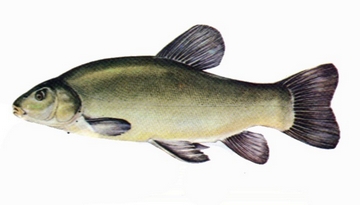The Tenchposted on 8 February 2015 | posted in Hints and TipsCommon name: Tench Latin name: Tinca tinca  Record weight: Fifteen pounds, caught by Darren Ward from a Surrey lake in June 2001. Distribution: Because of its economic importance as a food source, tench have been spread right across Europe and Asia by humans. In the UK they can now be found extending from the Scottish lowlands to the Southern tip of England. They are also common in Ireland. In Europe they are found from Scandinavia to Mongolia. Features: At first appearance the tench appears to be almost scaleless. In fact, tench are covered with thousands of tiny scales and a thick layer of slime, which protects them from damage as they slip between dense stands of aquatic plants in their natural habitat. Tench are difficult to confuse with any other species of freshwater fish as they are a dark olive green colour and have a bright red eye. The much rarer golden form is sometimes found, as it is commonly sold for garden ponds. Diet: Despite their relatively large size, tench tend to feed upon small invertebrates picked from the lake bed, or from plant stems. Small molluscs are often a favourite food source in established lakes, but in gravel pits bloodworm often make up the bulk of the diet of the tench. Spawning: Tench are one of the few species of coarse fish which can be sexed accurately at any time of the year. Male tench have large spoon-like pelvic fins with greatly thickened leading rays. The purpose of these modified fins is unknown. Tench lay around half a million eggs between June and August, although in cold years spawning may not occur at all in the UK. Eggs are laid in thick weed. Often the best place to look for spawning tench is in the thickest weed present. The fish will give away their presence by rolling in the weed during the early morning. Growth: A slow growing fish, often not reaching sexual maturity until at least the age of four. The maximum age of tench is not known, but fish of over twenty years old are known. |








.jpg)
.jpg)





